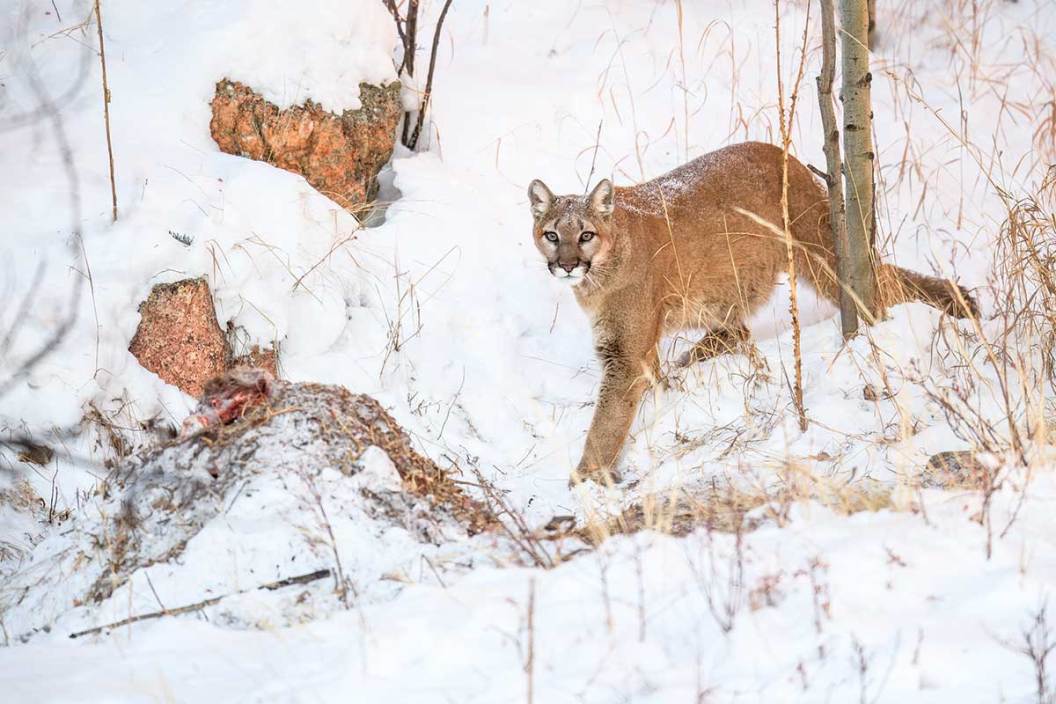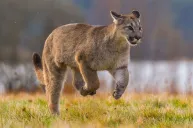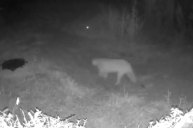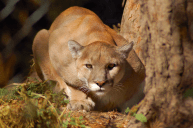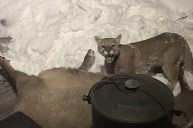Over the past 30 days, mountain lions have reportedly killed more than a dozen dogs in the Colorado town of Nederland and its surrounding areas. Residents are drawn to the area because of its remote nature and easy access to hiking, hunting, skiing, and mountain biking. While people are used to sharing the space with local wildlife—such as coyotes, moose, and black bears—mountain lions have presented a different challenge. It's one that has become worrisome, even terrifying, for some residents who've witnessed their dogs being dragged away or have found them post-attack. Many are wondering why Colorado Parks and Wildlife isn't doing more to manage the issue.
One resident, Pam Rose, told The Durango Herald that she had seen mountain lions for weeks watching the horses on her ranch near Roosevelt National Forest. On Dec. 9, she texted a Colorado Park and Wildlife official because she was worried about her 11-year-old's safety, as it seemed like two mountain lions were watching their home. Sarah Bennett, Rose's tenant, said she'd had run-ins with mountain lions during walks with her dog, Bagel. Rose texted the CPW after she felt convinced that a mountain lion was sitting and waiting for Bagel a mere 25 feet outside the back door.
"I felt like it knew our patterns. It knew Bagel lived there, and it was waiting to attack," Rose said.
While they prevented anything from happening to Bagel, other residents in the area have not been so lucky. The area's Facebook group, known as the "Nedheads," has a counter claiming that 23 dogs have died, disappeared, or been attacked between April 4 and Dec. 9, with the majority of incidents happening between Nov. 14 and Dec. 9.
The CPW's Area 2 Boulder South District wildlife manager, Sam Peterson, met with 140 residents at the Nederland community center, although most of his talk centered on how to live with the native mountain lion population. However, that did not address their questions about why the big cats are grabbing large dogs out of their backyards and accosting others while walking leashed with their owners.
Colorado issues mountain lion hunting licenses, but only 486 of the 2,493 issued were filled over the past season. Peterson said the number of lions is now "higher than what we want them to be in relationship to our management plan." He also pointed out that since mountain lions hunt in the dark, it is difficult to determine if it's one or multiple and to pinpoint identifying markers as one would with a bear. He said that the lions are likely drawn to the area "probably for the same reasons you're here: the prey availability, the shelter, the space. It's fantastic mountain lion habitat."
He told residents to trim tree limbs, cut back thick bushes, use floodlights or loud music to deter the big cats, and avoid taking dogs out during dusk and dawn. Colorado law states that wildlife can be killed if "real" property is threatened, such as motor vehicles, homes, and livestock. But dogs qualify as personal property.
Peterson did say that traps have been set out twice since the December attacks. The reasoning? He said it was because after lions killed dogs they "approached people to within about 10 yards."
"As morbid and messed up as it sounds, if we just have a dog getting attacked or killed and no human involvement, then it's just lions doing lion things, and we can't kill them," Peterson continued. "But if we were responding to every pet that was killed by wildlife with lethal removal, then we would be spending the majority of our time as officers (at least on the Front Range) doing that, and we would have to kill a lot of bears, lions, bobcats, and coyotes. Instead, I think the best solution is advocating for responsible pet ownership and being diligent with your pets when living or visiting areas where wildlife are likely to be."
Many residents want to know the specific reasons behind why the lions are attacking. Unfortunately, there isn't a clear answer. Some residents think it is due to the Gross Reservoir Dam expansion, while others think deer hunting is cutting into their food source. A local retired wildlife biologist, Eric Stone, said, "This is kind of a hard winter right now for lions. The ground is crunchy and makes a lot of noise. Lions are at a disadvantage to hunt their usual prey. And this lion might be sick or hungry or starving—taking advantage of easy prey."
Whatever the reason may be, attacks seem to have decreased in late December as more information was spread through the community, although an Aussie shepherd was taken off a porch on Dec. 26 near Rollinsville. The CPW is working to identify and haze the cats prowling near residents' homes. Peterson said, "So I thought it presented the best opportunity to try some more proactive hazing. And while it didn't really address the root of the problem (pets unattended outside), it could help to try to change behavior of a cat that has been targeting pets or ensure that that behavior doesn't manifest later on for an individual cat."
